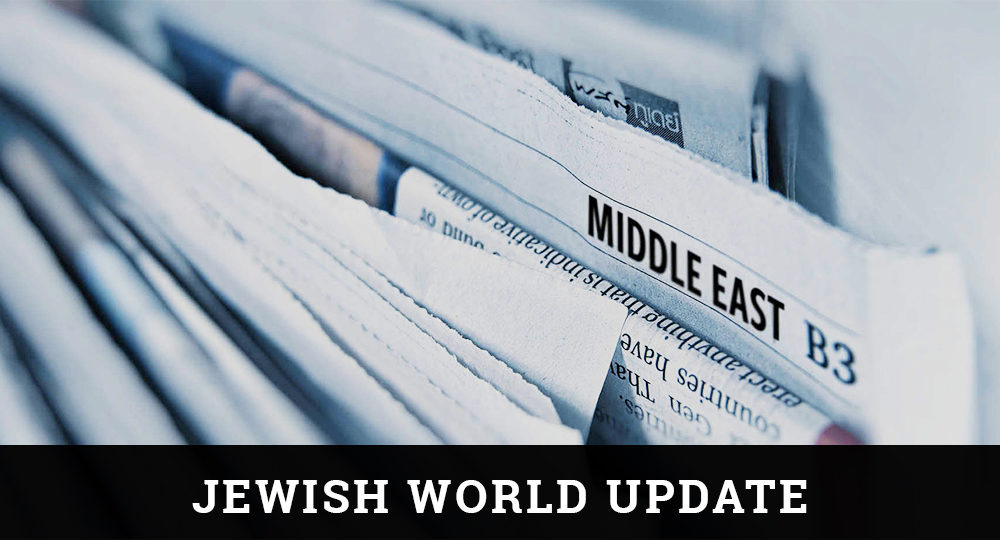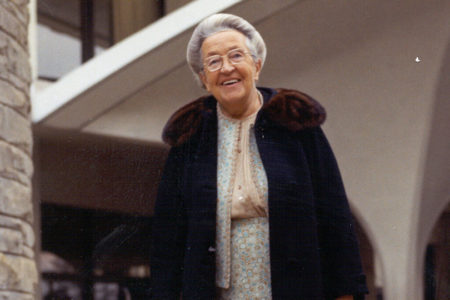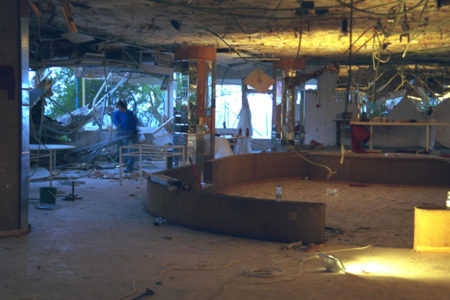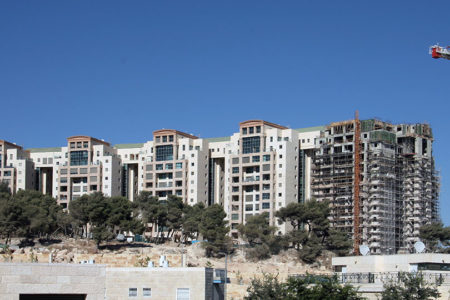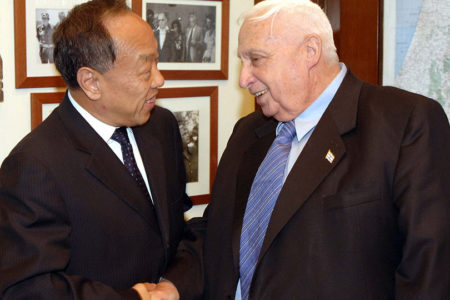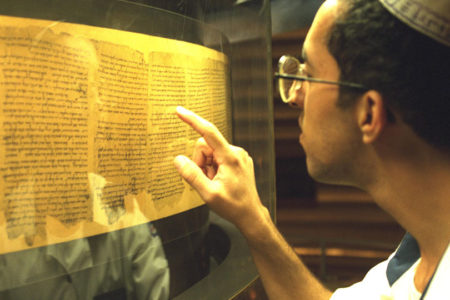Israel in the News: Special Report
Editor’s Note: Brigitte Gabriel is a survivor of Islam’s jihad against Lebanese Christians. Her story will astound you. Reared in an Arab country that taught her to hate Israel, her love for the Jewish state today is so strong that she disinterred her mother, who was buried in Lebanon, and reburied her on Mt. Zion so the world will know where her loyalty lies—with Israel.
She is a former news anchor in Jerusalem for Middle East Television and is a national lecturer on the Mideast conflict and founder of AmericanCongressforTruth.com. Her book Because They Hate: A Survivor of Islamic Terror Warns America is available in bookstores. We are privileged to reprint a portion of an interview she gave recently to Jamie Glazov, managing editor of Frontpagemag.com.
Gabriel: I was raised in the only Christian country in the Middle East, Lebanon. A lot of people think the Middle East has always been made up of Muslim countries. That is not true. There once were two non-Muslim countries in the Middle East. One is a Jewish state called Israel, which is under attack for its existence today, and the other was a Christian country called Lebanon, now under a Muslim majority controlling influence.
When Lebanon got its independence from France in the ’40s, the majority of the population was Christian. We didn’t have any enemies. We were merchant descendants of the Phoenicians, strong in commerce in which we prospered. In no time Lebanon became the Paris of the Middle East, the banking capital of the Middle East. We were the only westernized Arabic-speaking country in the region.
I was an only child to older parents. My parents were married for 22 years before I came into their lives. They were unable to have any children. My mother was 55 years old and my father was 60 when I was born. I had the ideal childhood, the love, adoration and attention of two mature adults who looked at me as a miracle in their lives and were thankful to God for blessing them with a child.
Even though I was raised in a Christian country, it was still an Arabic country trying to please its neighbors, the Arab Muslims. Even the Christian private school I went to was affected. When we studied the Bible, we only studied the New Testament. I never saw the Old Testament or heard anything about it because it was considered the enemy’s Bible. All I heard was Israel is Satan, Israel is the Devil, Israelis are demons, and they are the source of the problem in the Middle East. I was taught the Jews are evil, they are unstoppable, and they want to control the world. I heard nothing but hatred toward the Jews.
FP: Can you expand a bit on some of the tragedy that befell your family? I am sorry that this is painful territory.
Gabriel: The Christians in Lebanon always had problems with the Muslims, but we never thought our neighbors would turn on us. That situation was aggravated by the influx of the Palestinians coming from Jordan after King Hussein kicked them out in Black September. That’s what tipped the scale in Lebanon. Not only had Muslims become the majority, but they now also felt empowered by the presence of the Palestinians and Yasser Arafat wanting to attack the Christians, take over Lebanon, and use it as a base from which to attack Israel.
When the Muslims and Palestinians declared jihad on the Christians in 1975, we didn’t even know what that word meant. We had taken them into our country, allowed them to study side by side with us in our schools and universities. We gave them jobs, shared with them our way of life. We didn’t realize the depth of their hatred toward us as infidels. They looked at us as the enemy, not as neighbors, friends, employers, and colleagues.
A lot of Muslims poured in from other Muslim countries like Iran—the founder and supporter of Hezbollah, one of the leading terrorist organizations in the world today. They came from Somalia, Sudan, Syria, Jordan, and Egypt. The Lebanese civil war was not between the Lebanese; it was a holy war declared on the Christians by the Muslims of the Middle East.
They started massacring the Christians, city after city. Horrific events the Western media seldom reported. One of the most ghastly acts was the massacre in the Christian city of Damour, where thousands of Christians were slaughtered like sheep. The Muslims would enter a bomb shelter and see a mother and a father hiding with a little baby. They would tie one leg of the baby to the mother and one leg to the father and pull the parents apart, splitting the child in half. A close friend of mine was mentally disturbed because they made her slaughter her own son in a chair. They tied her to a chair, tied a knife to her hand, and holding her hand, forced her to cut her own son’s throat. They would urinate and defecate on the altars of churches, using the pages of the Bible as toilet paper. They did so many things. I don’t need to go into any more detail. You get the picture.
Americans just don’t realize the viciousness of the militant Islamic fundamentalists. I think the biggest disservice for the American people was the denial by the networks to air the beheading video of Daniel Pearl [Jewish reporter for The Wall Street Journal, murdered in 2002]. I think we as a society need to see what type of enemy we are fighting. People have been so sheltered in this country; they have not paid attention to what was going on in the last 20 some years. They were more interested in watching a documentary about Madonna than paying attention to world events.
The majority of the Lebanese army was Muslim. Christians went to universities, not to the military. The Muslims began taking over military bases across Lebanon. They combined their forces with the Palestinians and formed what they called the Arab Lebanese Army and started attacking the Christians. I lived 50 yards below the last military base left in the hands of the Christians. While attempting to bombard the military base their shells missed landing directly on my home, bringing it down and burying me under the rubble. I was 10 years old.
I woke up from a dream life into a nightmare. My eyes were blinded by the bright light of the explosions. But the light faded quickly as a hot liquid started pouring into my eyes, burning and shutting them closed like glue. I was wounded by shrapnel, which cut the artery in my arm that was twisted on top of my face. Blood was pouring over my face and into my mouth. By the time I was rescued by my parents and taken to a hospital the next morning at 8 A.M., I was on my last breath. I was put on a bench in the emergency room and operated on without anesthesia. As the nurses held me down, the doctors cut my flesh with scissors and sawed into my bone to get out the embedded shrapnel. As I faded in and out of consciousness, between my screams I prayed to God to stop my torture. I ended up in the hospital for two and a half months.
While there, I would ask my parents why this happened to us. They would say because we were Christians, and the Muslims want to kill us. So I knew ever since I was 10 that I was wanted dead simply because I was born a Christian.
When I returned home, my new home was no longer the one that I knew. We ended up living in a bomb shelter underground without electricity, water, and very little food. Little did I know that this would become my life for the next seven years. Our bomb shelter was an 8-by 10-foot cinderblock room buried under-ground, which my father used as a storage room for our restaurant.
FP: What is life like under the threat of Islamic terror?
Gabriel: We borrowed life one day at a time. After sleeping for a month in cardboard boxes that had been stored in the bomb shelter, thinking this would be over soon, we realized this situation was getting worse and worse. We finally furnished the bomb shelter with two old mattresses from our garage. My mom and I slept on one and my dad on the other. To get food my mother and I would go out and find different types of grass and dandelions to eat around the shelter in between the bombing. My mother would soak chickpeas, rice, lentils, and beans overnight so we could eat something during the day. My father couldn’t get out because, in the bombing of our house, he lost his hearing and he wouldn’t hear the snipers’ bullets or the bombs coming so he could hide. He had to stay put while my mother and I got out. To get water, we would crawl in a ditch under snipers’ bullets to a nearby spring. Every time we’d leave, we would say our last good-byes because we didn’t know if we would come back alive. My mother would use her stocking on top of the bottle to filter all the worms and the debris so we could drink it. Then we would crawl back with bullets flying over our heads. Sometimes it would take us hours just to crawl 100 feet back into the bomb shelter.
One day when I was 13, one of our soldiers warned us that we were no longer able to fight and we were going to be attacked viciously that night. He wished us a merciful death as he left. Knowing we were going to be slaughtered that night, I put on my Easter dress because I wanted to look pretty when I was dead, knowing that there would be nobody to prepare me for burial. I stood in my dress in front of the mirror, crying as my mother combed my long hair and tied a white ribbon in it. I told her, “Please, I don’t want to die. I’m only 13.”
FP: Discuss your intellectual journey about your view of Jews and Israelis, from what you were told in your childhood to when you started questioning whether it was true, to what you think today.
Gabriel: My town was two and half miles from the Israeli border. We in our Christian town were faced with the combined Muslim and Palestinian forces waiting to slaughter us. We knew our fate, knowing what they had done to other Christian towns and cities in the rest of Lebanon. To our back was Israel—the enemy, Satan, the demon possessed Jews. We had nowhere to turn but one way, to the devil Israel. After all, we knew the Jews wouldn’t slaughter us because we had more shared values with them than we had with the Muslims. Under the cover of darkness, a few men from our town went to the border, flagged down an Israeli border patrol, explained the situation, and begged for help.
Israel agreed to help the Christians. Israel became our lifeline. The Israeli military would come during the night and bring food and ammunition to the military and milk for the children. They would take the Christian men, any-one from age 13 to 70, and train them to fight; most of them had never held a rifle before. Most of the Christian men had degrees that decorated their walls, but all the degrees in the world cannot defend you when an enemy is facing you with a gun, wanting to kill you by what your enemy believes is an order from God.
The only reason we stayed alive is because Israel came into Lebanon and drove the Muslims away from the surrounding hills and set up positions in our town to protect us. Things got worse as Syrians, Libyans, Iranians, Egyptians became enraged and flocked into Lebanon to fight the infidel Christians and Jews.
The Muslims had one vision, to take control of the only Christian country in the Middle East and then attack Israel. Syria with its military already suffocating the Christians, Iran with its militia Hezbollah, the PLO with the number one world terrorist Yasser Arafat, and all the other Muslim zealots on a holy mission, were using Lebanon as a terrorist breeding ground, exporting terrorism into the rest of the world. Under the auspices of a peacekeeping force in Lebanon, Syria shelled Israel along with Hezbollah, the Iranian-financed holy warriors. The world press, which was getting its information from the Muslim-controlled areas in Beirut, were saying that Israel is occupying Lebanon and the poor Lebanese were fighting back to kick the Israelis out.
By 1982 Israel was fed up with Syria’s repeated attacks on its northern border. They invaded Lebanon, declaring war on the terrorist infrastructure, going all the way into Beirut. During the first two days of the invasion as the Muslims were retreating, they shelled us frantically. In their last artillery barrage, they scored a direct hit on the front of our bomb shelter. My mother was seriously wounded and would die without immediate medical attention. My father was too old and weak to take her to the hospital. The responsibility fell on my shoulders. We had to take her to Israel for treatment. For her it was a life-saving experience. For me it was a life-changing experience. It was my first lesson in the difference between the Arabs and the Western world, particularly the Jews.
Before we left, my father gave me $60 dollars in case I needed some money since we were going to Israel for treatment. We took her first to the Lebanese hospital in a town which was vacant and bombed out. There was an Israeli doctor on duty for first aid situations. He gave my mother first aid, and we put her in an Israeli ambulance and drove her under the bombs to the border. It was about a 10-minute drive; the driver was a friend of the family. When we got to the border we changed ambulances. The Lebanese driver asked me if I had any money for the ambulance fee. Like an innocent teenager who never handled money, I took it out of my pocket and handed it to him and asked him how much did he want. He said, “Give me $30,” which was half the money I had. I thanked him for driving us with tears dripping down my face and got in the Israeli ambulance, and we drove off.
The drive to the hospital inside Israel was an hour long. The driver was a middle-aged soldier. He treated me like his own daughter, with such respect and compassion. He listened to the radio and explained to me how the war was going in Lebanon. I felt alone and afraid. My mother was fading in and out of consciousness and moaning from pain. We got to the hospital, and I walked around the ambulance to pay him the fee. I took the money out of my pocket thinking, God, I’m sure this is not going to be enough for this man. If the 10-minute drive cost me $30, I’m sure this is going to be much more. I extended my hand with the money, asking him how much I owed him. He looked at me surprised and said, “You don’t owe me anything. The ambulance ride is a free service from us to you. Keep your money. I wish everything goes well with you. I wish your mother health, and speedy recovery.”
I thanked him from the bottom of my heart and thought to myself, What an honest man!!! What an ethical man! He could have taken my money and partied all night, and I would have not known the difference. Yet he didn’t. And all of a sudden I felt this anger towards the Lebanese driver who was supposedly a friend of the family. I realized that he actually stole my money. I didn’t have to pay a fee for the ambulance; he basically robbed me. I felt violated. I thanked the Israeli driver from the bottom of my heart for his honesty and help.
